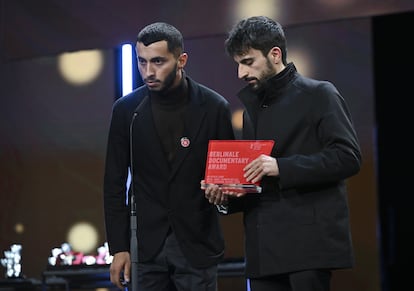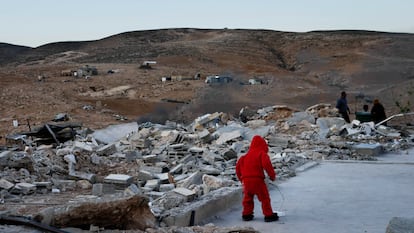‘We will be waiting for you’: Israeli filmmaker targeted by death threats after speech in Berlin
Yuval Abraham, winner of the best documentary award at the Berlinale with Palestinian Basel Adra, has faced a backlash over his commentary on the Gaza war

It lasted barely three minutes but a week later the Berlinale speeches delivered by Israeli Yuval Abraham and Palestinian Basel Adra still reverberate, to the point of having become a matter of security — Abraham has not returned to his country due to death threats — and debate about balanced discourse on the Middle East conflict and how Germany manages its historical responsibility for the Holocaust.
Last Saturday, Abraham and Adra, both journalists and activists, received the award for best documentary as co-directors of No Other Land. The film, not yet released on the commercial circuit, tells the story of their friendship, Adra’s personal story, and the expulsions and demolitions of homes where he lives, Masafer Yatta, an inhospitable area in the southern West Bank whose 1,000 Bedouin inhabitants can be evicted at any time after the Supreme Court declared it a military firing range last year.
On stage, the Palestinian was the first to speak: “It is very, very difficult for me to celebrate something while tens of thousands of my people are being massacred in Gaza right now. As I am here in Berlin, I would like to ask Germany to do one thing: to respect the UN appeals and stop sending weapons to Israel.” Abraham then spoke to denounce both would return (he believed then) two days later to a land where they are not equal. “I live in a civilian regime and Basel in a military regime. We live 30 minutes from each other, but I have the right to vote and Basel does not. I can move freely around the country, but Basel, like millions of Palestinians, is trapped in the West Bank. This apartheid situation between the two, this inequality, has to end,” he said.
The Berlinale hall erupted in an ovation that has caused problems for the Minister of Culture, Claudia Roth. For joining it, she has faced calls for her resignation. On Monday, her ministry surprisingly came out to clarify on social networks that the applause “was aimed at the Jewish-Israeli journalist and filmmaker,” and not the Palestinian, as the former “spoke in favor of a political solution and peaceful coexistence in the region.”

The issue has taken on such a dimension that Abraham has stopped talking to the media. “He wants to lower his profile, in light of everything that is going on,” says a friend who prefers to remain anonymous. Nor does Adra respond to requests for interviews.
Earlier this week, Abraham spoke to the Israeli daily Haaretz after canceling his flight back to Israel because of the death threats. “I’m getting dozens, if not hundreds, of anonymous messages, like ‘When you come back, we’ll be waiting for you, you son of a bitch,’ ‘I’ll hunt you down at the airport.’ I’m a journalist and I’ve written things more critical than what I said in the speech, but I’ve never experienced anything like this [...] I’m scared. It’s been very stressful,” he said.
Abraham, 29, is a journalist in left-wing media in his country and abroad and has remained active on social networks, where on Tuesday he posted a tweet in which he denounced that a right-wing mob went to his house the day before to look for him and threatened immediate family members, who had to flee to another city during the night. “I am still getting death threats and had to cancel my flight home,” he writes. His friend confirms that he has not yet returned to Israel.
All this has happened, he laments, after Israeli media and German politicians “absurdly labeled” his speech “as anti-Semitic.” “The appalling misuse of this word by Germans, not only to silence Palestinian critics of Israel, but also to silence Israelis like me who support a ceasefire that will end the killing in Gaza and allow the release of the Israeli hostages, empties the word antisemitism of meaning and thus endangers Jews all over the world,” he says.
After recalling that his grandmother was born in a concentration camp in Libya and that most of his grandfather’s family was killed in the Holocaust, he added: “I find it particularly outraging that German politicians in 2024 have the audacity to weaponize this term against me in a way that endangered my family,” he says. And “much more so” Adra’s, living under military occupation and surrounded by Israeli settlers. “You can have harsh criticism of what me and Basel said on stage without demonizing us. If this is what you’re doing with your guilt for the holocaust — I don’t want your guilt,” he concludes.
A right-wing Israeli mob came to my family’s home yesterday to search for me, threatening close family members who fled to another town in the middle of the night. I am still getting death threats and had to cancel my flight home. This happened after Israeli media and German…
— Yuval Abraham יובל אברהם (@yuval_abraham) February 27, 2024
Solidarity
On Monday, 40 Israeli filmmakers, including Ari Folman and Guy Nattiv, expressed solidarity with the duo. They accused the response by Israeli public television of “cheap populism and incitement in public discourse” and stressed that nothing in Abraham’s speech was anti-Semitic, but a “factual description of reality in the West Bank.”
Last Monday, in an opinion column, the head of the Kan news channel’s culture section, Dorit Assaraf Mizrahi, criticized Abraham, “who claims to be a journalist,” for not mentioning in his speech the Hamas attacks that triggered the Israeli offensive, which has left more than 30,000 people in Palestine dead. “An entire country was dragged into the war on October 7 and you, coward, didn’t bother to say a word,” he wrote.
The absence of any reference to the attacks, in which hundreds of militiamen penetrated Israel and killed some 1,200 people, mostly civilians, and kidnapped more than 240 others - is one of the main criticisms, both in Israel and in Germany. German Chancellor Olaf Scholz himself has deplored “such a one-sided position,” according to a government spokesman. The organizer of the festival, Mariëtte Rissenbeek, has come out to say that she understands the “indignation” caused by some speeches that were “perceived as too biased and, in some cases, inappropriate.” She would have preferred, she said, “more differentiated statements” on the Middle East conflict.
Israel’s ambassador to Berlin, Ron Prosor, has seized on the controversy to accuse the German cultural scene of “rolling out the red carpet exclusively for artists who promote the delegitimization of Israel.” “At the Berlinale, anti-Semitic and anti-Israel discourse was met with applause [...] Under the guise of freedom of expression and art, anti-Semitic and anti-Israel rhetoric is celebrated,” he tweeted.
Sign up for our weekly newsletter to get more English-language news coverage from EL PAÍS USA Edition
Tu suscripción se está usando en otro dispositivo
¿Quieres añadir otro usuario a tu suscripción?
Si continúas leyendo en este dispositivo, no se podrá leer en el otro.
FlechaTu suscripción se está usando en otro dispositivo y solo puedes acceder a EL PAÍS desde un dispositivo a la vez.
Si quieres compartir tu cuenta, cambia tu suscripción a la modalidad Premium, así podrás añadir otro usuario. Cada uno accederá con su propia cuenta de email, lo que os permitirá personalizar vuestra experiencia en EL PAÍS.
¿Tienes una suscripción de empresa? Accede aquí para contratar más cuentas.
En el caso de no saber quién está usando tu cuenta, te recomendamos cambiar tu contraseña aquí.
Si decides continuar compartiendo tu cuenta, este mensaje se mostrará en tu dispositivo y en el de la otra persona que está usando tu cuenta de forma indefinida, afectando a tu experiencia de lectura. Puedes consultar aquí los términos y condiciones de la suscripción digital.









































